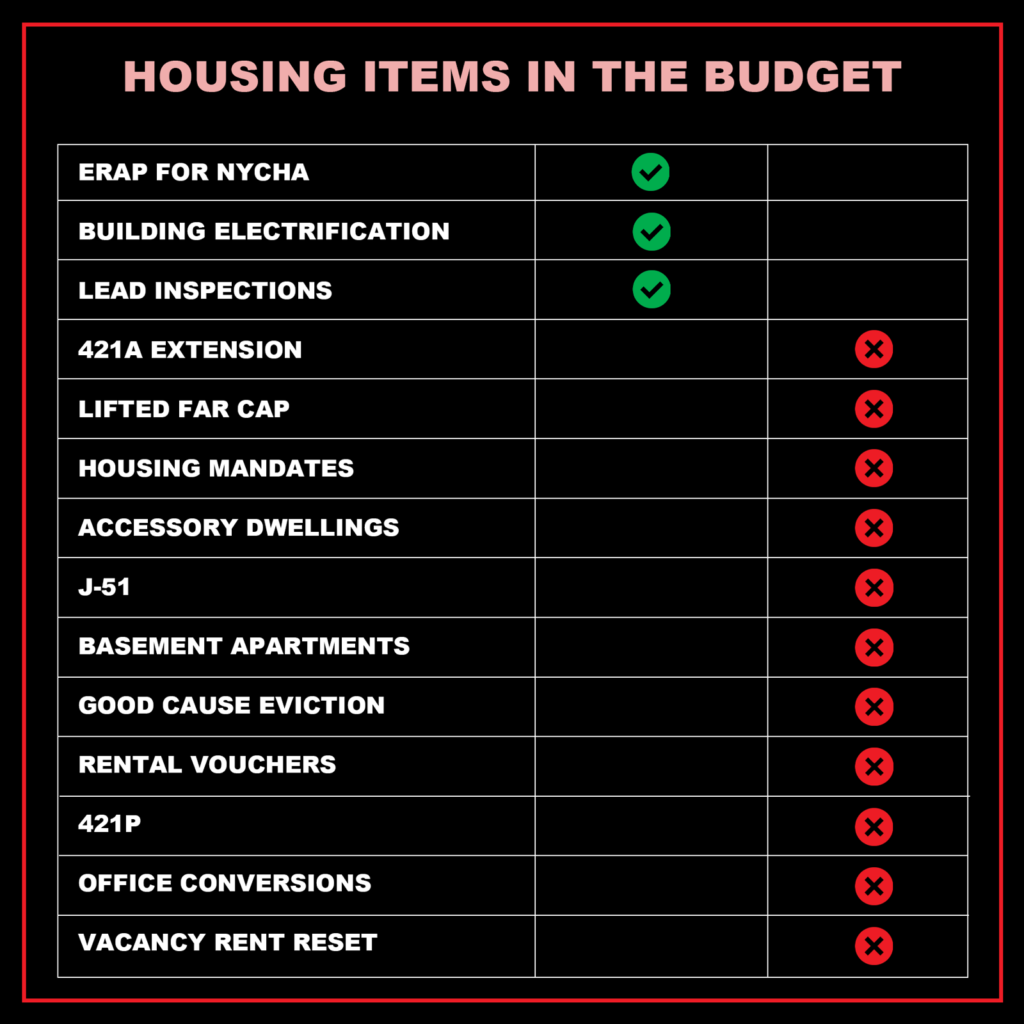Policies to increase housing in New York City and statewide were a top priority for Gov. Kathy Hochul when she proposed her budget. After three months of wrangling, state lawmakers included virtually none of them in the spending agreement.
Hochul on Thursday announced they had agreed to a “conceptual framework” on a $229 billion state budget, which is nearly a month late. Formal approval by the Senate and Assembly are expected in the coming days.
Among the few real estate measures that survived budget negotiations was one to ban gas hookups in new construction, starting in 2025 in small buildings and 2028 for larger ones.
A coalition of environmental advocates called the measure historic, but voiced concern that its effectiveness would be blunted in the final budget. The groups — including Earthjustice, Food & Water Watch, New York Communities for Change and New York Public Interest Research Group — suspect a provision granting localities effective veto power will be inserted at the behest of fossil fuel lobbyists.
“New Yorkers are watching carefully to make sure the final budget includes real action and doesn’t defer to the gas lobby,” the groups said in a statement. “New Yorkers don’t want a big announcement that turns out to be a sham.”
The budget deal includes $391 million to expand the Emergency Rental Assistance Program to tenants of public and government-subsidized housing., but the state will not reopen the ERAP application portal. That’s a relief to landlords, who complained that tenants abused it to avoid paying rent.

The governor was unable to garner enough support for her “New York Housing Compact,” which set targets of 3 percent growth in housing stock every three years for downstate localities and 1 percent upstate. It called for rezoning near transit stations to allow more housing, and created a builder’s remedy-type program for developers in localities that failed to meet housing growth targets.
On Thursday, Hochul indicated that she plans to take executive action on housing in the coming weeks. She said she is not “walking away” from the issue, acknowledging that major change can sometimes take time.
“Comparing us to other states that have made the tough decisions that have made a difference, it didn’t happen overnight, it did not happen in three months. In many cases it took decades,” she said.
The Senate and especially the Assembly resisted the idea of housing growth mandates, instead favoring incentives. Assembly Speaker Carl Heastie told reporters this week that more time was needed to hash out the issue.
“When you want to make transformative change in policy, there has to be an education period,” he said.
Several other housing proposals were cut from the governor’s proposal, including an extension of the 421a construction deadline and a replacement for another tax break, J-51. The governor had also proposed 421p, a 421a-like property tax break for localities outside New York City, but that failed as well.
Efforts to ease office-to-residential conversions were thwarted on several fronts, including by opposition to lifting the cap on the city’s residential floor area ratio. Some lawmakers wanted to require affordable units in office conversions, without offering a tax break or subsidy.
Jim Whelan, president of the Real Estate Board of New York, said that New York would continue to be a “national embarrassment when it comes to housing policy” until lawmakers wise up.
“Earlier this year, Governor Hochul and Mayor Adams proposed ambitious and critically needed plans to create more housing for all New Yorkers,” he said in a statement last week. “In response, state legislative leaders proposed ideas driven by extremist ideology, a heaping dose of NIMBYism — and with little understanding of basic economics.”
Last year Hochul pitched legalizing accessory dwelling units statewide. She abandoned that, instead presenting ADUs as a way for localities to comply with her housing growth mandate. Another proposal that would authorize the city to legalize basement apartments also was excluded from the budget.
“These are self-inflicted wounds. There are plenty of models across the world of housing policies that create abundant housing, lowering rents, while also providing adequate protections to renters,” said Jay Martin, executive director of the Community Housing Improvement Program, in a statement. “What we need now is political will to act.”
His group had pushed for a measure allowing owners of rent-stabilized apartments a one-time rent reset on vacant units. CHIP will now push for the introduction of a standalone bill, but it is seen as a longshot because of tenant groups’ opposition.
Even policies that seemed to have consensus among landlords and tenant advocates, such as a state-based rental voucher program, did not survive the process. Both the Assembly and Senate’s one-house budget bills included funding for such a program.
Tenant advocates, who opposed the governor’s broader housing plan because it did not include good cause eviction, are pushing for the vouchers and eviction protections to be approved before the end of the legislative session. Housing Justice for All on Friday called the budget an “embarrassment and a collective failure.”
“Tenants were clear: Without strong rental assistance and protections from unjust evictions, Hochul’s plan simply would not deliver,” campaign coordinator Cea Weaver said in a statement. “But rather than negotiate for these common-sense proposals to improve upon her plan, Governor Hochul dug in her heels and refused to even negotiate on a compromise with legislative leaders.”
Lawmakers have until June 8 — the last day of this year’s legislative session — to pass bills. They will then adjourn until January.
Suzannah Cavanaugh contributed reporting.
Read more



